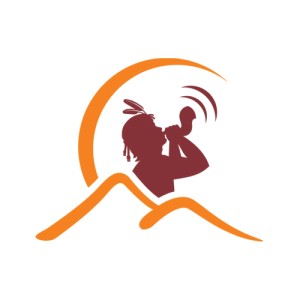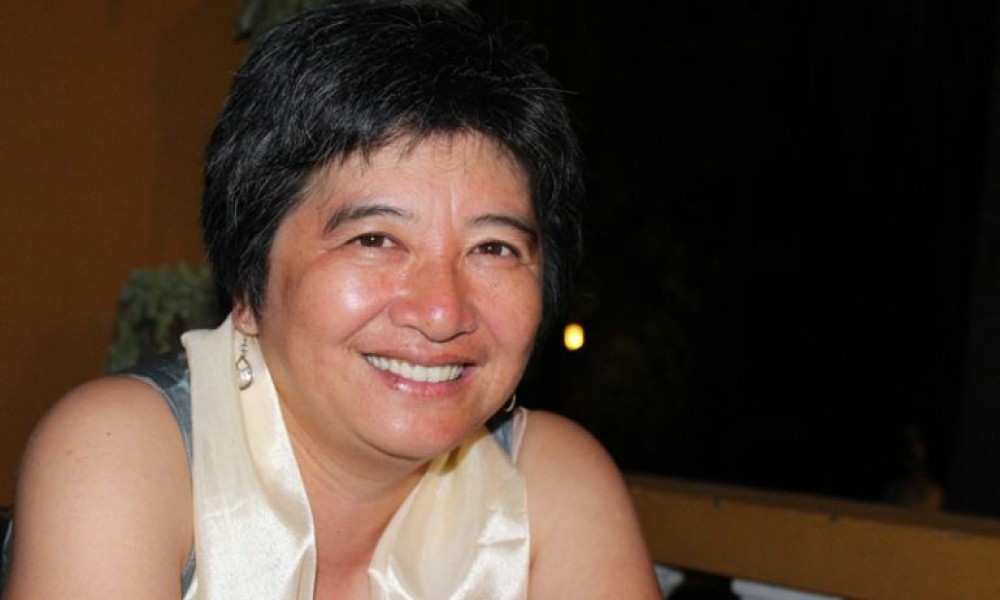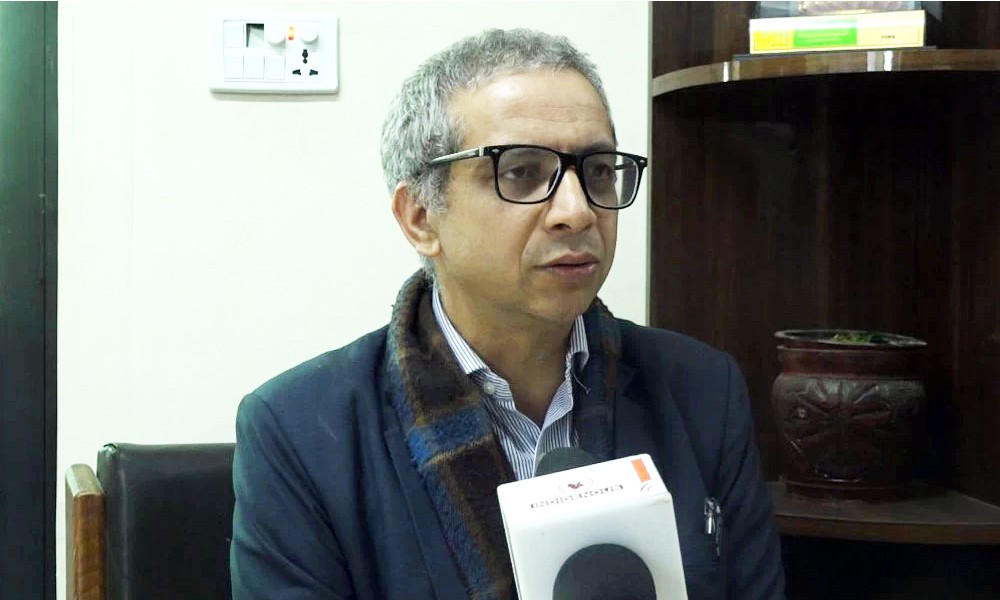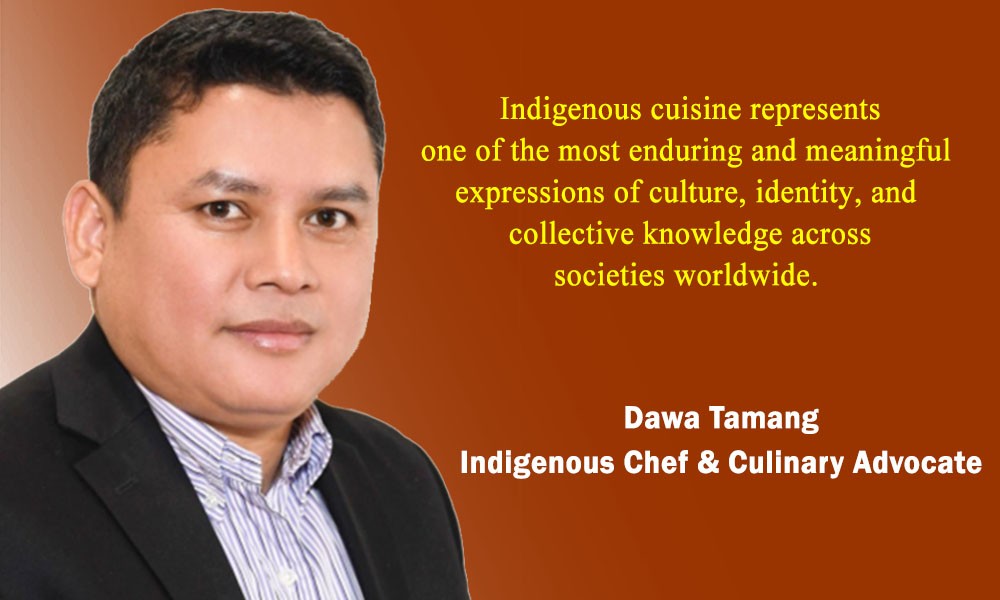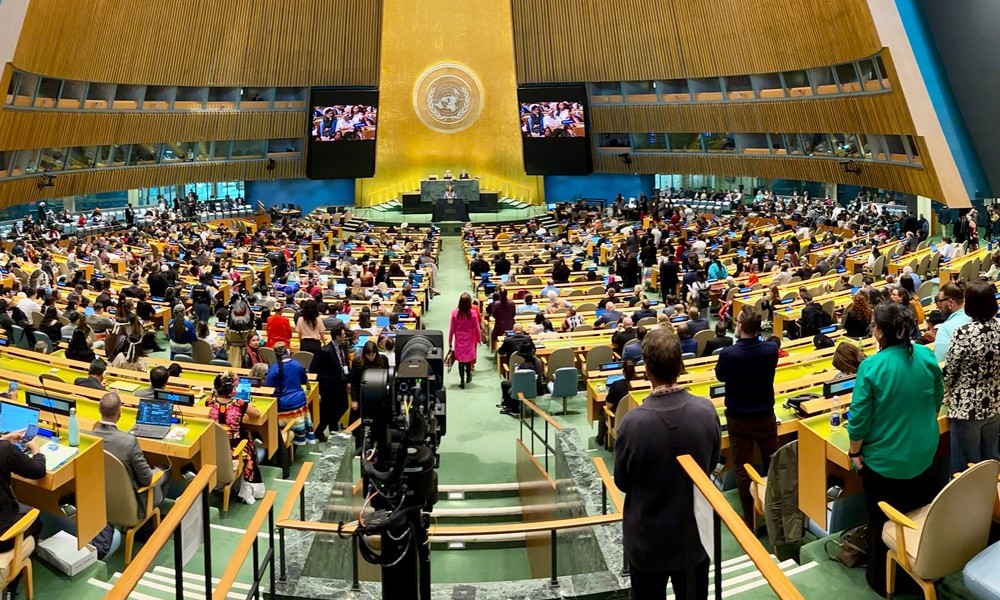Joan Carling, UN indigenous expert-member of UN Permanent Forum on Indigenous Issues (UNPFII) appointed by UN Economic and Social Council (ECOCOS) and a Secretary-General of Asia Indigenous Peoples Pact (AIPP),
Joan Carling is Secretary-General of Asia Indigenous Peoples Pact (AIPP), a regional organization of Indigenous Peoples Organization in Asia and is also UN indigenous expert-member of UN Permanent Forum on Indigenous Issues (UNPFII) appointed by UN Economic and Social Council (ECOCOS). She is well known Kankanaey indigenous activist from from the Cordillera, Philippines. She has been working on indigenous peoples' issues at the grassroots to international levels for more than 25 years specializing in human rights, the principles and application of Free Prior and Informed Consent (FPIC), climate change and so forth. She has been also been actively engaging in international bodies, processes and mechanisms such as with International Financial Institutions, the UN Framework Convention on Climate Change (UNFCCC), REDD+ related mechanisms, UN agencies, and mechanisms relating to human rights and sustainable development in advancing the issues and concerns of indigenous peoples in Asia. Here are the experts of interview taken on her observation of indigenous peoples' rights in constitution writing process in Nepal and by Dev Kumar Sunuwar for indigenousvoice.com.
What is your observation on constitution writing process in Nepal?
Well, as far as I know that the process has been going on for last 8 years, but what I find fundamentally problematic and it is driven and controlled by the political parties and it is not really inclusive and there is not meaningful participation of different peoples and sectors which were not ensured. Say the Adibasi janajatis, madhesis, dalits, and the most marginalized seems to have been more marginalized in this process. So it is not surprising that the draft now that does not reflect at all the rights and aspiration especially of marginalized and their demand for example of autonomy, right to self-determination particularly for janajatis, what is stated is setting up 8 –federal states, but that does not provide for the ensuring that the marginalized peoples will be empowered, will be part of the decision making and that Is a big problem and also their full control of their lands, territories and resources and determining how they are going to be used .
It is not just for the development as well as really people driven kind of agenda. This substantive matters are not in the draft constitution, fundamental rights and freedoms are not guaranteed, in spite of the fact that the government of Nepal is a member of the UN which has to abide by the UN charter and by all the conventions that it has signed so it is clear that within the UN charter, that every state has the responsibility to respect fundamental rights of everyone, not withstanding sex, religion, ethnicity, culture and that everybody is entitled to dignity that is basis of our existence so that duty of state is not guaranteed in the constitution that you have like now. Well the constitution does not say that Nepal will be secular country. It has clear biasness for Hindu religion, not protecting the right of every citizen to choose their own religion. That is the human right. That is the fundamental right of everyone. That is going to be big problem again to the country like Nepal, which is so diverse culturally as well as religion.
You have been working in Asia and you have looked upon closely the provisions of constitution of Asian countries, how and what sorts of rights of indigenous peoples have been guaranteed in the constitution of different Asian countries?
There are special provisions in certain countries, with respect to indigenous peoples. In the case of Philiphine, where I come from, where there is only 10 to 12 percent of the population is indigenous. even if we are very very minority in terms of population. There are clear articles in the constitution that provides for the recognition of our right to self-determination through regional autonomy and our right to land, territory and resources, that includes the free prior and informed consent.
Nepal government already has clear international obligations. It has already ratified Convention No. 160, also voted yes to UNDRIP. It is the duty of government now to incorporate into the constitution or in the laws of land, the provision of ILO Convention 169 and UNDRIP, such as Indigenous peoples' right to lands, territories and natural resources, free prior and informed consent, the respect for cultural heritage and traditional livelihood or occupation of them.
Similarly, In India, there is also special measure, for what they call schedule tribe. They even have the forest Rights acts protecting the forest rights of the indigenous peoples for their food and livelihood. In Malaysia, what they call native land title for the Orang Asal (for the indigenous peoples of Malaysia). Indonesia, indigenous peoples have recently won the case, in the constitutional court. They had filed the case against the government move that the government in Indonesia claimed that all the forest is government owned. The indigenous peoples challenged. The constitutional court held that customary forests are not the state forests. They belong to the customary peoples. In Indonesia, indigenous peoples are called customary peoples. So these are some of the provisions how different Asian Constitutions and the laws that have guaranteed rights of indigenous peoples.
This shows that the indigenous peoples' rights have been guaranteed in the constitution in one way or other. Well currently, Nepal is also in the process of writing constitution. What sorts of rights and how do you think, new constitution of Nepal should ensure the rights of indigenous peoples?
To begin with, Nepal government already has clear international obligations. It has already ratified Convention No. 160 on Indigenous and Tribal Peoples (ILO C. 169), which is specifically relating to the rights of indigenous peoples. Similarly, it has voted yes to United Nations On the Rights of Indigenous Peoples (UNDRIP). It is thereby obliged and it is the duty of government, now to incorporate into the constitution or in the laws of land, the provision for examples of ILO Convention 169 provides the recognition of indigenous peoples right to lands, territories and natural resources, it also provides the right to free prior and informed consent. Similarly, it also provides the respect for cultural heritage and traditional livelihood or occupation of the peoples. So those should already the matter of obligation of Nepal and it should incorporate in the constitution. Another side, the government of Nepal has also signed the International Convention on the Elimination of All forms of Racial Discrimination (CERD). So it has to ensure that there is measure that will guarantee non-discrimination, whether you are Adivasi Janajati, or whether you are Dalit or madhesi, you all are equal in rights. But that is also not there in the draft constitution.
Similarly, relating to women, Nepal government also has signed the Convention on the Elimination of All Forms of Discrimination Against Women (CEDAW). Thus Nepal now has to offer the measure on how to protect women against violence and discrimination. I have not seen any reflection in the existing draft constitution. Similarly, there is also the issue of participation of women in the constitution in proportionate to their population. The representation should be proportional to the population of marginalized population, like indigenous women, dalit, Madhesi etc. should also be there, not from the dominant group. So my views is that this is the long drown struggle the constitution writing process of which, there is strong resistance by the ruling class, by the political parties to share power, with the Adibasi janajtis (indigenous nationalities/ peoples), which is 38 percent, with the Dalits, with the Madehsis, and other marginalized communities. They have refused to acknowledge that Nepal is multicultural country that there should be power sharing. That is the problem. They want to have full control on most of political and economic life of Nepal, which is really a problem.

Nepal has duty to fulfill its obligation expressed in the international forum. But what if, it does not fulfill its duty. Is there any international law that can force Nepal to be obliged by its duty?
Unfortunately, there is no such International court that can force country to fulfill its treaty obligation. But, all UN member countries like Nepal have made agreement with the UN system to implement the decision and recommendation made by the UN. Nepal government therefore also has made an agreement within UN system. It has agreed to be abide by. Time and again, UN system has made recommendation and it has advised Nepal to address the aspiration of indigenous peoples and other marginalized groups. UN system though cannot force, that is its limitation. What the important is, it is the citizen who are to claim their right. It is the citizen they have to stand up for their right against the dominant group. It is also big challenge for Adibasi janajaties, Dalits, Madhesis and other marginalized groups to come together and hammer on dominant group and challenge the political parties and the ruling class in Nepal to ensure their rights and compel them to share the power.
AIPP, being regional organization has always been helping hand and the part and partial of Nepal's indigenous peoples movement, how is AIPP supporting Nepalese IPs movement during last 8-years, especially to ensure their rights in the constitution writing process?
AIPP has always been the part and partial of Nepalese indigenous peoples' movement. I, myself have been to Nepal, several times with different capacity and provided some input on how we try to influence on the Constitution writing process. What are the legal rights of indigenous peoples to be incorporated in the Constitution. for this we have worked closely to raise awareness also in the process, also in terms of strategy. More than these, We have expressed our solidarity to the movement of Nepalese indigenous peoples. We are supporting staying behind as we are not the one to be in the front line. The Indigenous Peoples of Nepal are the front line. So it is the largely also from them, what kinds of support they need from us. It is not that they depend on us rather than they really need to strengthen their movement in their country. We have always been behind them on every demands and struggles. We have been supporting Indigenous Peoples of Nepal to draw the attention in the global level including in the UN system, not only about the constitution writing process but also about the tragic earthquake.
What are the major rights of indigenous peoples that do you think should not be missed out to include in the constitution?
The inherent collective rights of indigenous peoples is one, the right to their distinct identity as indigenous peoples that they should not be discriminated based on their identity that they have the right to self-determination, which can be expressed is through autonomy in federal set up. They have right to control in their land, territories and natural resources, they should be the one decision on how the resources are going to be used and the right to cultural heritage, the right to their religion and spirituality.
This is the time where Nepal should already embrace inclusive democracy and that should be the framework of constitution on how to have inclusive democracy and non-discrimination. And how to achieve a quality based also in equity.
These are what their collective rights of Indigenous peoples, these rights should be respected, protected and also that there should be provisions how these rights are going to be fulfilled in Nepal. Since the constitution is the basic framework, it doesn't provide all. But there should be outset already saying that we respect and recognize the rights of indigenous peoples consistent with UNDRIP and in line with our obligation with the convention 169 with the following features. That is what supposed to be the language in the constitution. I also would like to stress the rights of indigenous women and particular needs of disabled, because, we can also not talk only just about indigenous peoples alone, but need to be inclusive. This is the time where Nepal should already embrace inclusive democracy and that should be the framework of constitution on how to have inclusive democracy and non-discrimination. And how to achieve a quality based also in equity. So those are the key principles which should be operationalized within that will later guide the laws which will be made in support of the constitution.
If anything to add?
Currently, Nepal is in clear historical juncture. It is either finally become a inclusive democracy or the remain in the status quo. The status quo is that the dominant group will continue to be the one in control of the political or economic power of Nepal. The draft constitution as it stands now is to maintain status quo. So the challenge now is for the indigenous peoples, Dalits, Madhesis and other marginalized communities to come together and challenge and make strong resistance in the adoption of this very discriminatory even racist draft constitution that is not based on the obligation of the state, when it comes to respect and recognition of the rights of its citizen. So, in particular, I would like to appeal to the political parties that they need to heed the call, demand and aspiration of the majority of the people of Nepal. That is the only way where peace and democracy will prevail. If they still insist to hold the political power there will always be conflict and the development and prosperity will never happen for the majority of the people of Nepal and I think that is really contrary to humanity.


